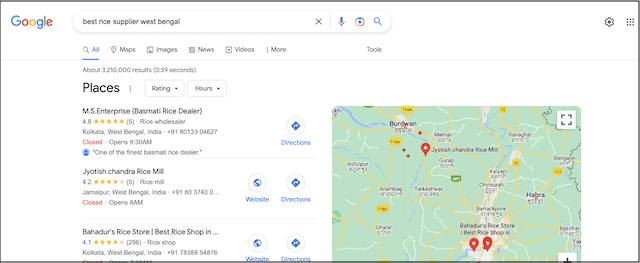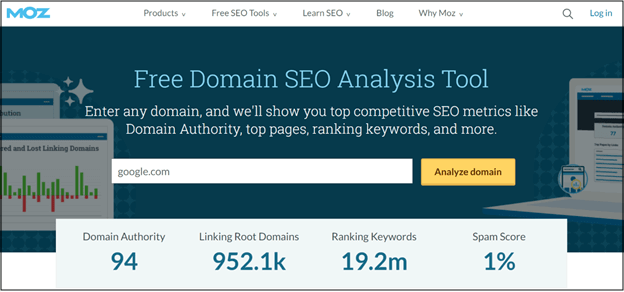Business success requires optimizing your website for maximum visibility in search engines. After all, this is how most of your future customers will find you. However, there are situations when you may be in the dark about your site's performance. And even when you believe you've done everything perfectly, it doesn't rank as highly as you'd want in search results.
This is where domain authority (DA) comes into play.
But what does this measure actually mean?
Is there any correlation between domain authority and search engine rankings?
Does it make sense to work toward making changes?
This post will explain domain authority and factors that should be considered to improve your site's domain authority rank.
Editor’s note: Curious how much your domain name is worth? Type it into GoDaddy’s domain appraisal tool to find out.
What is domain authority?
Domain authority is a measure of a website's rank in search engine results and may be considered an indicator of its overall quality.

A product of the software engineering company Moz, domain authority provides an estimate of how well a website will perform in search engines.
Moz’s Link Explorer web index provides the foundation for domain authority, which bases its calculations on a wide range of variables.
The actual computation of domain authority uses a machine learning model to identify a "best fit" technique that most closely connects the link data with ranks across thousands of actual search results that Moz employs as standards to scale against.
This "best fit" approach gives the domain authority score its predictive power.
Note: Domain authority is of interest to domain investors as well as owners of business websites, as it factors into the monetary value of the domain name.
What is a domain authority score?
To determine the DA score for a particular domain name, Moz considers 40 different variables. Inbound links and root domains are a few examples of these. The former is particularly crucial in determining the score since a site with many inbound links from reliable and relevant sites will perform better.
The fact that many other websites link to yours tells Google it is high-quality.
Imagine that you manage an online store. To improve your ranking, you'll need to have inbound links to blog entries, product pages, gift guides and other specific pages on your site.
Websites with zero inbound links often have authority scores of one or below.
Related: How website analytics could supercharge your business
How do I find my domain authority?
Link Explorer, MozBar (Moz's free toolbar), and the SERP Analysis tab in Keyword Explorer are all great places to look at a website's domain authority. All Moz Pro campaigns, the Moz API, and dozens of other web search engine optimisation (SEO) services all use domain authority data.
Different SEO tools such as Semrush, have created their own authority measures. Semrush uses an algorithm that considers factors such as these when determining an authority score:
- Backlinks
- Referring domains
- Search traffic volume
These are all helpful indicators of your website's health compared to competing websites.
See your domain authority for free.
What is a good domain authority?
Is a domain authority of 30 good? What is the domain authority of Google.com or GoDaddy.com?
Domain authority ratings can range from very low for small companies and websites with few inbound links to very high for sites with a huge number of high-quality external links (like wikipedia.com).
Domain authority starts at one for every new website and rises as more and more quality links are directed to the site.
This is one reason why content marketing is a good idea – it attracts inbound links.
Finding out where your immediate competitors are in terms of domain authority might give you an advantage. Domain authority indicates a site's capacity to rank within its unique competitive environment. This is why you shouldn't choose your ideal DA out of context.
DA is the best metric to use if you want to identify which websites are your real competitors and have stronger link profiles than you do.
There is no such thing as a "good," "average," or "bad" domain authority score.
Rather, there are only "good," "average," and "bad" ratings related to the context in which they are measured.
For reference, anywhere between 20 and 30 is on the right track, and anywhere between 30 and 50 is excellent. After your score is between 50 and 60, it is quite strong.
Once you have broken through that barrier and are now in the zone between 60 and 100, you have an exceptional domain authority score.

Google has a domain authority score of 94, while GoDaddy has a score of 93.
How is domain authority determined?
No, domain authority is not taken into account when ranking websites. Moz has spoken forward to clarify this situation, confirming:
Domain authority is not a Google ranking factor and has no effect on the SERPs.
Then, what precisely is domain authority?
You may use it as a yardstick to evaluate your site's performance. Use it to get a sense of whether or not your SEO approach is in line with industry standards.
While a higher DA does not have any direct effect on SEO, it might have an indirect effect on the success of your SEO efforts.
Domain authority is useful even when you're going after a highly competitive search phrase or keyword because higher scores tend to correspond with higher search engine rankings. Gaining better search engine ranks is indicative of a high DA score.
How to increase domain authority?
Let's put this into action and find out how to outrank the competition by increasing your domain authority.
It's not only about the number of links to your site, as Google points out.
It's also about the quality of those links — in other words, how many help Google to understand what your site is about.
Here are a few things to keep in mind as you work to increase your domain authority:
- Prioritize high quality above quantity. Give importance to the few hundred links that really matter instead of the countless that don't.
- Look at your inbound links and ensure all the high-quality ones are do-follow (you can learn how to check links here).
- Make it likely that people will want to connect to your site by producing useful information. Pages and posts tailored to your core demographic are more likely to spread like wildfire.
- Update your blog's older articles. Add fresh, interesting content to those pages that have a low page authority score. Consider using a free content optimization tool to improve both old and new articles and pages.
- You need to find your competitors so that you may evaluate yourself against them. Borrow their strategies to help your site get more attention.
- Look into the link-building strategies.
- Promote your website's original and exciting content via word of mouth, email, and social media.
What is the difference between domain authority and page authority?
Domain authority evaluates how likely a website as a whole is to rank well on search engine results pages (SERPs).
Page authority estimates how likely an individual page on your website is to rank well in search engine results pages.
The latter can help you evaluate how well specific web pages — such as blog articles or product pages — perform and see which ones could benefit from some improvement to get a better overall grade.
Using the page authority metric may determine which pages in your digital strategy have the most room for development, allowing you to refine your focus accordingly.
Let’s have a look at the role that search engine optimization plays in domain authority.
Related: Blogging for beginners
How to apply domain authority to SEO work
SEO is a well-defined series of steps that any website owner can take to improve their site’s performance in search engine results.
- In-depth examination by way of comparison. It might be instructive to check the domain authority of sites that are direct competitors in the search engine results and see how your website compares.
- If your competitor has a better score, you should identify what tactics they are using that you are not. Investigate methods of improving your own score to move ahead of them in search engine rankings.
- Boost the amount of content. Knowing your domain authority is low might motivate you to work on increasing or improving your content output. When your site has high-quality content, other sites are more inclined to connect to it, increasing your domain authority (as long as those sites have high domain authority).
- Verify the worth of sites that have linked to you. Spend time analyzing the sites that link to yours, checking to see if they're all reputable sources. Their domain authority scores can be used as a quality indicator of your website.
- Start a link-building campaign. Do you hope authoritative resources like educational institutions and news outlets will connect to your website? One tactic is to reach out to them and offer to write a guest article for them in exchange for a link to your website.
Start building your domain authority today
Building your domain authority is an ongoing process that takes time and doesn't provide benefits immediately.
If you want more people to visit your website, though, you should follow these best practices so that it ranks higher on search engine results pages.
Implementing these steps can help boost both the quality and quantity of your leads, not only your domain authority.






